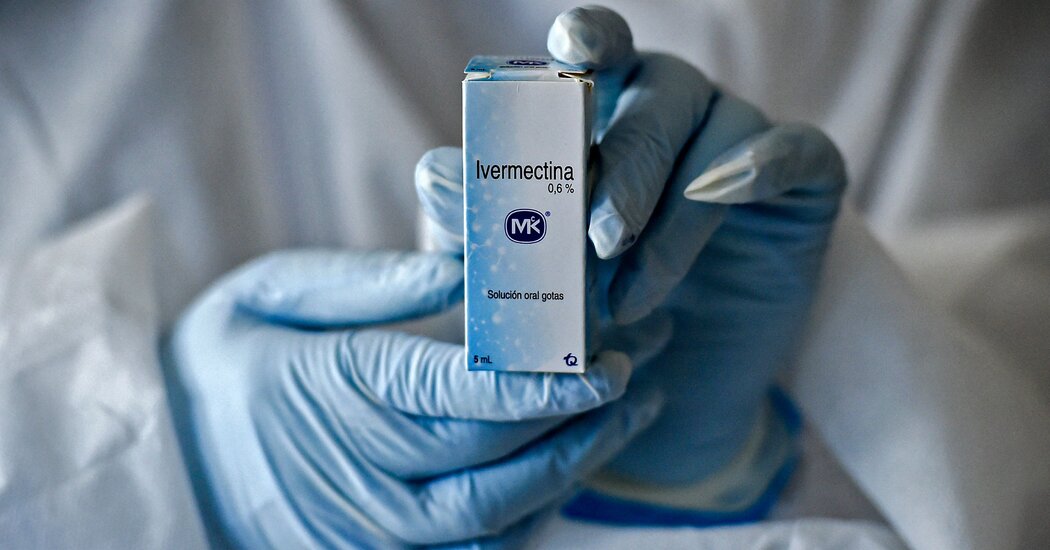
An Ohio judge on Monday reversed an earlier decision requiring a hospital to administer ivermectin, an anti-parasitic drug that is primarily used as a veterinary deworming agent, to a patient as a treatment for Covid-19.
The judge, Michael A. Oster Jr., wrote that “there can be no doubt that the medical and scientific communities do not support the use of ivermectin as a treatment for Covid-19” and that the plaintiff had failed to provide convincing evidence to show that it was effective.
The Food and Drug Administration has warned Covid-19 patients against taking ivermectin, which has repeatedly failed in clinical trials to help people infected with the coronavirus. Concentrated doses intended for horses and other large livestock can be toxic in humans, the agency has said.
However, the drug has become a popular subject among conservative talk show hosts. Physicians and toxicologists have raised alarms about people obtaining ivermectin from livestock supply centers amid a surge in calls to poison control centers about overdoses and adverse reactions to the drug.
The Ohio lawsuit was filed by Julie Smith, who was acting as the guardian for her husband, Jeffrey Smith. A different judge granted a 14-day injunction last month, ordering West Chester Hospital north of Cincinnati to administer the drug to Mr. Smith, who was being treated there for Covid-19.
Ralph Lorigo, a lawyer representing Ms. Smith, said in a statement on Tuesday that Mr. Smith received ivermectin for 13 days before the injunction was issued, and that he believed the drug saved his life.
“In the four days before the hearing the ventilator setting was able to be reduced to 50 percent,” Mr. Lorigo said. “On the Friday after the hearing the doctors were talking to Julie about removing” her husband from the ventilator, he said.
A spokeswoman for West Chester Hospital, Kelly Martin, welcomed Judge Oster’s decision.
“We do not believe that hospitals or clinicians should be ordered to administer medications and/or therapies, especially unproven medications and/or therapies, against medical advice,” Ms. Martin said in a statement on Tuesday. “We are grateful for the judge’s careful consideration and for the judicial process in this matter.”
Mr. Smith, 51, tested positive for the virus on July 9 and the following week was admitted to West Chester Hospital’s intensive care unit, according to court documents. Mr. Smith’s condition declined. On Aug. 1, he was sedated, intubated and placed on a ventilator.
Ivermectin was introduced as a veterinary drug in the late 1970s. It has since been approved for human use, in tablet form, to treat some types of parasitic worms, and topical formulations have been authorized to treat head lice and skin conditions such as rosacea, the F.D.A. said.
It has not been approved to treat or prevent Covid-19. It was prescribed by Mr. Smith’s physician, who does not have privileges at West Chester Hospital and did not see Mr. Smith before approving the treatment, court records show.
“While the court is sympathetic to the Plaintiff and understands the idea of wanting to do anything to help her loved one, public policy should not and does not support allowing a physician to try ‘any’ type of treatment on human beings,” Judge Oster wrote. “Rather, public policy supports the safe and effective development of medications and medical practices.”
At a hearing last week, Mr. Smith’s physician testified that he “seems to be” doing better since receiving ivermectin. But the doctor said he was not sure if continued use of the drug by Mr. Smith would be beneficial, court records show. Ms. Smith testified that she believed the drug was working.
The Centers for Disease Control and Prevention, the F.D.A. and other agencies have in recent weeks warned against the use of ivermectin to treat Covid-19, particularly the more potent formulations for animals.
An overdose could lead to visual hallucinations, seizures and “an altered mental state,” the C.D.C. said, adding that ivermectin products used in animals or to treat human skin should not be swallowed.
None of that has kept some conservative radio hosts and Facebook and Reddit users from touting ivermectin as a potential Covid cure, fueling a surge in demand in recent months.
After sharing last week that he had tested positive for the virus, the podcast host Joe Rogan said in an Instagram video that he had “thrown the kitchen sink at all kinds of meds,” including ivermectin. Phil Valentine, a conservative talk show host, died in August after being hospitalized with Covid-19. He had told listeners that, in addition to taking vitamin D, he had found a doctor who would prescribe ivermectin.
As some patients turned to animal supply stores to obtain veterinary formulations of the drug, the National Poison Data System recorded that, from July to August, cases of ivermectin exposure more than tripled, to 459 from 133.
Pharmacists also reported difficulty in restocking the drug as prescriptions increased to 88,000 in recent weeks from a prepandemic weekly average of 3,600, according to the F.D.A.



